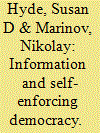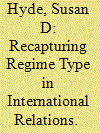|
|
|
Sort Order |
|
|
|
Items / Page
|
|
|
|
|
|
|
| Srl | Item |
| 1 |
ID:
097630


|
|
|
|
|
| Publication |
2010.
|
| Summary/Abstract |
Randomized field experiments have gained attention within the social sciences and the field of democracy promotion as an influential tool for causal inference and a potentially powerful method of impact evaluation. With an eye toward facilitating field experimentation in democracy promotion, I present the first field-experimental study of international election monitoring, which should be of interest to both practitioners and academics. I discuss field experiments as a promising method for evaluating the effects of democracy assistance programs. Applied to the 2004 presidential elections in Indonesia, the random assignment of international election observers reveals that even though the election was widely regarded as democratic, the presence of observers had a measurable effect on votes cast for the incumbent candidate, indicating that such democracy assistance can influence election quality even in the absence of blatant election-day fraud.
|
|
|
|
|
|
|
|
|
|
|
|
|
|
|
|
| 2 |
ID:
131498


|
|
|
|
|
| Publication |
2014.
|
| Summary/Abstract |
This article argues that when democracy is not yet institutionalized, leaders have little incentive to push for clean elections, in part because they are likely to face accusations of fraud from domestic opposition groups regardless of their true behavior. Reputable international election observers can facilitate self-enforcing democracy by providing credible information about the quality of elections, thus increasing citizens' ability to coordinate against the regime when election fraud occurs, and discrediting "sore loser" protests. Patterns of postelection protests are consistent with the argument, including that postelection protests are more likely and last longer following negative reports from international observers. International election observers help promote democracy by making postelection protest more accurate in the short term, thereby increasing incentives for leaders to hold democratic elections in the long term.
|
|
|
|
|
|
|
|
|
|
|
|
|
|
|
|
| 3 |
ID:
080921


|
|
|
|
|
| Publication |
2007.
|
| Summary/Abstract |
By pressuring governments to hold democratic elections and by becoming directly involved in the electoral process through technical assistance and funding or as election monitors, international actors now play a visible role in domestic elections and other democratic processes throughout the developing world. although scholars have documented several macrolevel relationships between international-level variables and movement toward democracy, there has been little attention paid to the microlevel effects of international involvement in the democratization process. this article examines the effects of international election observation as a prominent form of international involvement in domestic elections and exploits a natural experiment in order to test whether international observers reduce election fraud. using data from the 2003 presidential elections in armenia, the article demonstrates that although observers may not eliminate election fraud, they can reduce election-day fraud at the polling stations they visit. the unusual advantage of experiment-like conditions for this study offers unique causal evidence that international actors can have direct, measurable effects on the level of election-day fraud and, by extension, on the democratization process
|
|
|
|
|
|
|
|
|
|
|
|
|
|
|
|
| 4 |
ID:
172846


|
|
|
|
|
| Summary/Abstract |
A wave of recent research challenges the role of regime type in international relations. One striking takeaway is that democratic and autocratic leaders can often achieve similar levels of domestic constraint, which in many issue areas results in similar international outcomes—leading many to question traditional views of democracies as distinctive in their international relations. In this review essay, we use recent contributions in the field to build what we call a “malleable constraints” framework, in which all governments have an institutionally defined default level of domestic audience constraint that is generally higher in democracies, but leaders maintain some agency within these institutions and can strategically increase their exposure to or insulation from this constraint. Using this framework, we argue that regime type is still a crucial differentiator in international affairs even if, as recent studies suggest, democratic and autocratic leaders can sometimes be similarly constrained by domestic audiences and thus achieve similar international outcomes. This framework helps reconcile many competing claims in recent scholarship, including the puzzle of why autocracies do not strategically increase domestic audience constraint more often. Just because autocracies can engage audience constraints and democracies can escape them does not mean that they can do so with equal ease, frequency, or risk.
|
|
|
|
|
|
|
|
|
|
|
|
|
|
|
|
|
|
|
|
|